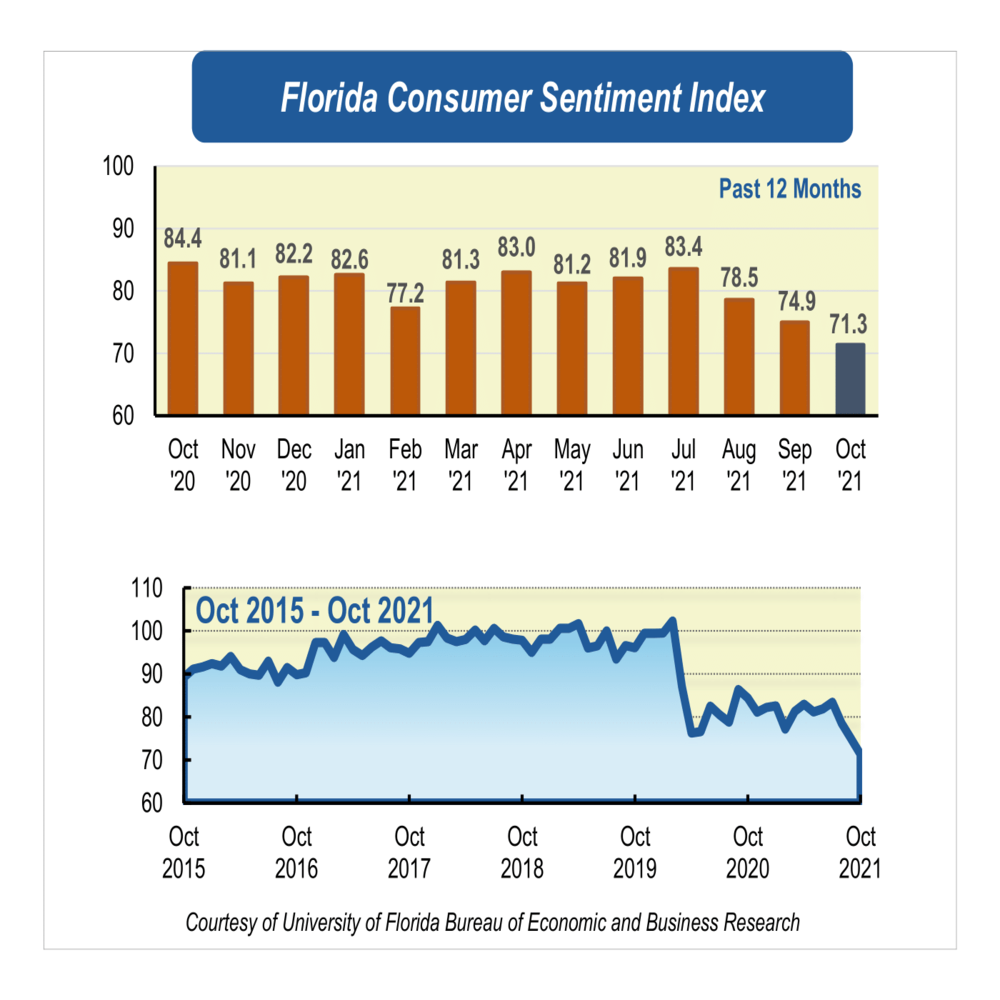
October consumer sentiment tumbles signaling a continued slow economic recovery
Consumer sentiment among Floridians dropped for a third consecutive month in October to 71.3, down 3.6 points from a revised figure of 74.9 in September and down 5 points from the pandemic low recorded in April 2020.
All five components that make up the index declined.
Floridians’ opinions about their personal finances now compared with a year ago decreased one point from 71.4 to 70.4. Similarly, opinions as to whether this is a good time to buy a major household item like an appliance plummeted 6.5 points from 69.1 to 62.6. Nonetheless, opinions were split by demographics with women, people older than 60, and people with annual income under $50,000 reporting more-favorable opinions to the former component and people with annual income under $50,000 expressing slightly more optimistic views to the latter.
“Spending intentions have dropped steadily for the past five months. This component recorded not only the greatest decrease of any reading this month, but also its largest month-to-month decline since April 2020. This trend suggests that consumers are increasingly considering holding off their purchases of big-ticket items, a worrying sign for retailers in the run-up to the holiday shopping season and the economic recovery since spending is the major driving force behind economic growth,” said Hector H. Sandoval, director of the Economic Analysis Program at UF’s Bureau of Economic and Business Research.
Similarly, the three components on future economic conditions deteriorated in October. Expectations of personal financial situations a year from now fell 3.6 points from 89.4 to 85.8. This view is shared by all Floridians with the exception of people older than 60, whose readings showed more optimistic views. Expectations of U.S. economic conditions over the next year plummeted 5.4 points from 72.6 to 67.2. Likewise, expectations of U.S. economic conditions over the next five years dropped 1.6 points from 72.0 to 70.4. These expectations were shared by all Floridians in the former component, while people older than 60 and people with an annual income over $50,000 expressed more optimistic views in the latter.
“While spending intentions decreased sharply this month, another worrisome trend has emerged regarding future economic conditions. For three consecutive months, outlooks about expected national economic conditions in the short- and long-run have decreased substantially, and they are currently 5.5 and 18.9 points down from April 2020 respectively, reaching their lowest levels in the last eight years,” Sandoval said.
“Consumer confidence trends are in line with the current economic outlook. According to the latest release from the Bureau of Economic Analysis, the U.S. economy grew at its slowest pace of the recovery in the third quarter of 2021 as a result of the supply-chain disruptions, higher prices, and labor shortages that have characterized the economy in the past months. On the bright side, Florida is soon welcoming back international visitors, which will improve the economic prospects for the tourism industry. Looking ahead, as the issues that have slowed the pace of the recovery are far from resolved, we expect consumer confidence to remain weak in the coming months,” Sandoval added.
Conducted September 1 through October 28, the UF study reflects the responses of 249 individuals who were reached on cellphones and 298 individuals reached through an online panel, a total of 547 individuals, representing a demographic cross section of Florida. The index used by UF researchers is benchmarked to 1966, which means a value of 100 represents the same level of confidence for that year. The lowest index possible is a 2, the highest is 150.
Details of this month’s survey can be found at https://www.bebr.ufl.edu/wp-content/uploads/2021/11/csi_2021_2_november.pdf
